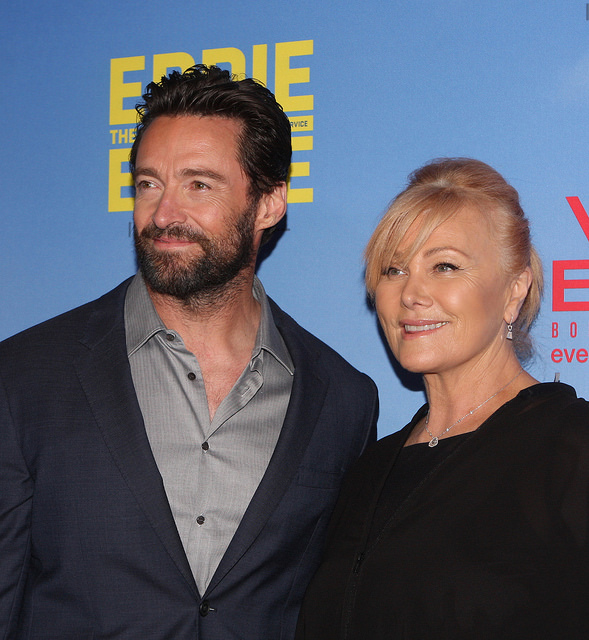Celebs becoming pregnant late in life may be giving women false hope about their fertile timeframe.

(Photo "Hugh Jackman, Deborra-Lee Furness" by Eva Rinaldi is licensed under CC BY-SA 2.0)
If you stay up to date with pop culture or just see tabloids in the grocery store line, you have probably noticed that celebrity pregnancies are a hot topic. We all like to believe that people in the public eye are just like us, but these buzz-worthy pregnancies tend to give a false sense of reality when it comes to fertility.
Why? Many of these famous mommies-to-be are at advanced maternal age (35 and older), and they often fail to share what it took for them to become pregnant at this stage.
We hear about the pregnancy, but not the journey in headlines that came out over the course of recent celebrity pregnancies. These articles do an excellent job of keeping fans up to date on what these future moms are up to in their personal lives.
In my opinion, not revealing such fertility treatments gives women false hope about their own reproductive window. Seeing and hearing about celebrities of advanced maternal age having babies leads women to believe that they can easily become pregnant later in life too.
My favorite celebrity infertility news
Celebrities may not want to admit they needed help getting pregnant because they fear it might damage their images as powerful, independent females who can do anything they put their minds – and bodies – to. It is not uncommon for highly un-famous infertility patients to want to keep their treatments a secret, from friends, even family members.
It is completely their right. And so it is, too, for a celebrity. But for me, if a female celebrity of advanced maternal age has gotten pregnant through infertility treatments, well, that’s the time to step up as a role model. They could explain that like many other older women seeking to have a family, they needed a little help. End of story.
What I really enjoy is seeing celebrities freely admit they’ve turned to infertility treatments. Did you hear about Hugh Jackman and his wife Deborra-Lee Furness, who had miscarriages after two IVF (in vitro fertilization) pregnancies?
“While you’re going through IVF and get pregnant, every day [the feeling is], We’re still holding! We’re still holding…!” Jackman said. “You know how precarious it is and how much she’s been through to get there. And [miscarriage] is a massive letdown. It’s really difficult – and much harder for the woman.”
Did you read actress Elisabeth Röhm’s blog on People.com dishing on her IVF treatments to conceive? That’s the kind of celebrity fertility news that can really help others struggling with infertility to know that in that regard, the celebs are just like them.
Redbook ran a great story earlier this year profiling 24 celebs who struggled to conceive, many using infertility treatments. From Jimmy Fallon and wife Nancy Juvonen (surrogacy) to Jordana Brewster (gestational carrier) to model Chrissy Teigen and husband John Legend (struggled to conceive), they were all up front about infertility. That’s a great message: They’re humans, just like us.
Scientific data is the most honest news, if not the juiciest
That’s the kind of celebrity infertility news that’s worthwhile. A near miraculous celebrity pregnancy near 50 without all the story isn’t, at least not in my view as a champion for infertility awareness.
It is important to know that these tabloid stories on late-life pregnancies might be leaving out some very important information. Becoming (and staying) pregnant at advanced maternal age is not as easy as celebrities make it look.
At the end of the day, celebrities are people just like the rest of us. They have the same reproductive timeline as you or I and they require the same medical attention.
It is no secret that tabloids do not always produce the most accurate news. For this reason, I encourage women to consider scientific facts, as opposed to using celebrity news as their go-to resource for fertility information.
Facts on advanced maternal age
Women are born with all of the eggs that they will ever have. These eggs are continuously lost during menstrual periods over the course of a woman’s life. By the time a woman hits advanced maternal age, she has diminished ovarian function or reserve (fewer healthy eggs due to natural aging). As a woman continues to age, her ovarian reserve continues to diminish.
By the time a woman hits age 35, her ovarian reserve is considered low. By the time she hits age 50 she has probably begun going through menopause (the ceasing of menstruation). Menopause indicates the end of a woman’s reproductive years.
With all of this being said, it would not be surprising if the mature-age celebrities that you read about needed reproductive assistance to become pregnant. While we do not know for sure, it is possible that these celebs either froze their eggs earlier in life to preserve reproductive potential, or they received the healthy embryos or eggs from a younger egg donor. The next likely step would be for them to use IVF to fertilize the eggs and become pregnant.
It is not impossible to become pregnant at advanced maternal age. Clearly, women can have children later in life but the realistic option to do so is through fertility treatment.
My recommendation to women who are interested in becoming pregnant at advanced maternal age is to start by checking their fertility. This can give some insight as to where they are in terms of their fertile window. From here, women can work with a fertility specialist to determine the best course of treatment.
